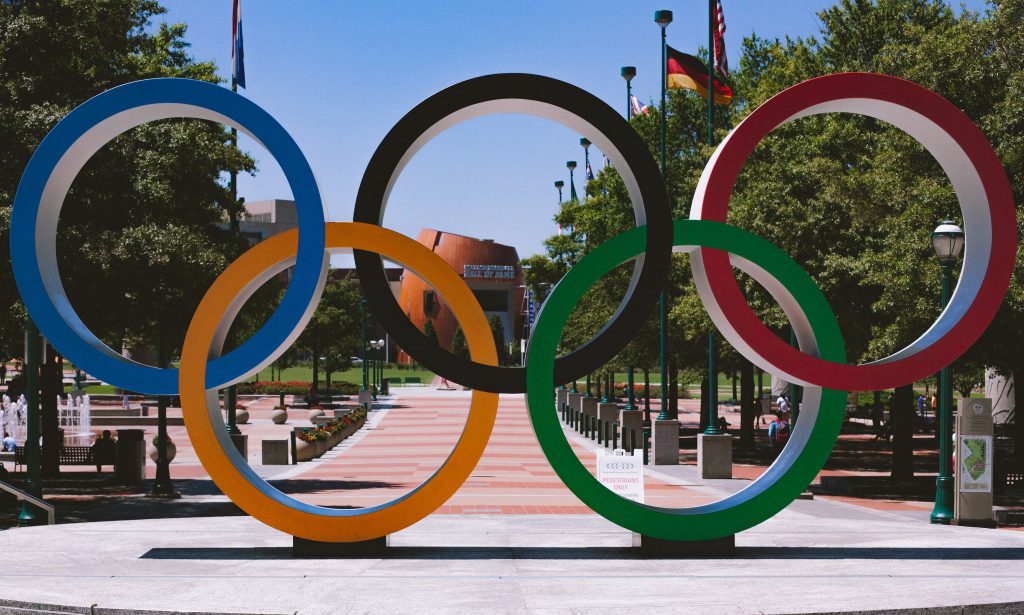BJJ is an immensely popular sport and martial art, which leads some people to wonder whether BJJ is an olympic sport. In this post I explain whether there’s jiu jitsu in the olympics, why there should or shouldn’t be BJJ in the olympics, and I predict whether there will be BJJ Olympics in the future.

Is there jiu jitsu in the olympics?
No, there’s no jiu jitsu in the olympics. Neither Brazilian jiu jitsu or Japanese jiu jitsu. The only martial arts in the 2020 Tokyo Olympics were Judo, wrestling, boxing, karate and fencing.
There was an article earlier this year about BJJ coming to the 2024 Olympic games in the JiuJitsuTimes. However, this article was an April fools joke. So jiu jitsu won’t be in the 2024 Olympics.
Why is BJJ not an olympic sport?
There are a few reasons why Brazilian jiu jitsu is not an Olympic sport. They have to do with the organizational structures of BJJ, its rules and its relation to other Olympic sports.
BJJ doesn’t have a unified governing body
The first reason why BJJ is not an Olympic sport is that there is no single governing body for it. This is a consequence of the fact that BJJ was developed from a variety of martial arts, with no single individual or group to establish a single set of rules or regulations.
The International Olympic Committee requires that only sports with a unified international governing body may be considered for inclusion. This is necessary because there needs to be one governing body that decides which athletes can go to the Olympics. Currently, BJJ fails to meet this requirement.
BJJ does not have a single set of rules
BJJ does not have a single set of rules. It is a mixed martial art with a wide variety of different strategies and techniques. This means that there are many different ways to score points, with some methods being more popular in one region or practice than in others.
The IOC requires sports to have a single set of rules to level the playing field for all athletes. BJJ doesn’t meet this requirement, as some of the major organizations allow different submissions and have vastly different scoring mechanisms.
BJJ is not a spectator sport
The third reason why BJJ is not an Olympic sport is that it’s not a spectator sport. BJJ is more of a practitioner sport, where only people that do the sport themselves watch it. People that don’t do BJJ themselves, don’t understand it when they watch it.
There are some BJJ techniques which are spectacular to watch, but they are few and far between. To make BJJ a better spectator sport, they would have to make big changes to its rules, including aggressive stalling calls. People want to see action in a combat sport, so you need to make sure that action is happening at all times.
BJJ is too similar to other martial arts
The final reason why BJJ isn’t an olympic sport is that it looks too similar to Olympic Judo to lay people. The IOC doesn’t want different sports that are too similar to each other in the Olympics as it may be either boring or confusing to spectators.
And I know that every BJJ practitioner knows there are big differences between Judo and BJJ, but not enough for the IOC. One option would be to include no gi instead of gi BJJ, but then the IOC would probably think the differences between wrestling and BJJ weren’t big enough.
BJJ is not global enough to be in the Olympics
BJJ is an international martial art and sport. However, a very small number of countries completely dominate the scene (most notably Brazil and the USA).
The IOC prefers sports in which every country can send high quality representatives. If BJJ were an olympic sport, it’s likely that most countries wouldn’t be able to send any athlete at all. And Brazil would get almost all the medals. This would be a bit crazy, we also don’t send American football to the Olympic games for the same reason.
Should BJJ be in the olympics?
In my opinion, there are benefits and disadvantages of jiu jitsu in the olympics.
The benefits of BJJ in the Olympics
There are some major benefits for BJJ to become an Olympic sport:
- The Olympics is the biggest stage in the world. It would be a huge achievement for BJJ to have the sport in the olympics. It would be huge for the BJJ community. There would be more focus on jiu jitsu, more people would be interested in learning jiu jitsu, and it would spread more positive messages about BJJ.
- As an Olympic sport BJJ would instantly be taken more seriously. It’s likely that if BJJ were an Olympic sport, many countries would subsidize it. This would lead to more gyms being opened, more schools offering jiu jitsu, and so forth.
- A unified rule set can bring BJJ athletes of different tribes together. This has drawbacks too, but it would be nice if we had a single framework in which we could evaluate who the greatest jiu jitsu athlete of all time is. Galvao and Gordon couldn’t dodge each other any longer!
- BJJ would become more exciting to watch. I’m not sure how they’ll do it, but the Olympics will outlaw double guard pulls and butt scooting once and for all. In my mind, this is mostly a good thing.
The disadvantages of BJJ in the Olympics
I think there are some negative aspects of jiu jitsu in the olympics:
- The Olympics would force BJJ to unify its rules. This has benefits, but it will also lead to dogmatism and less progress. Much of the recent progress in BJJ has come from leg locks in the no gi community, which are illegal in gi BJJ. More different rule sets leads to more diversity and more innovation in the sport.
- The Olympics would force BJJ to adopt stalling calls. It has to make it exciting for people to watch, but this comes at the cost of some of the patience that’s inherent in jiu jitsu. It’s called ‘the gentle art’ and a big part of that is the ability to wait for your opponent to leave an opening. The Olympics would rob BJJ of this identity.
- The BJJ Olympics would only be for black belts. One unique feature of BJJ competitions is that they are also for colored belts. Sometimes the brown belt and purple belt divisions at the World Championships are even more exciting than the black belt division! We would lose this if BJJ became an Olympic sport, and the Olympics want to preserve the meaning of the black belt as the ultimate expert status.
Will jiu jitsu be in the olympics?
No, I don’t think jiu jitsu will be in the Olympics any time soon.. There are a few deep questions that would have to be answered about BJJ, to which the BJJ community currently doesn’t have an answer. These are about the goals and rules of BJJ.
If BJJ were to be an Olympic sport, what uniform would it use?
This cuts right into the gi vs no gi debate in BJJ. The Olympics would force us to choose one over the other and to instantly dismiss half of our athletes.
Traditionally, the gi has been the uniform, but most of our recent rise in popularity is because of no gi. So this is a very hard question to answer.
Is BJJ about submissions or control?
Traditionally, you can win BJJ matches on points. But, this is also one of the main reasons why many people find a BJJ competition boring to watch. Submission only matches are more popular nowadays.
But, the BJJ point system has deep roots that tie it to mixed martial arts and the UFC. Mount is a lot of points in BJJ because you could hit your opponent in a vale tudo match or street fight. This connection would be lost if BJJ became pure submission wrestling.
Are leg locks allowed in Olympic BJJ?
This is related to the question about the uniform, as it splits the BJJ athletes into the same 2 buckets: those that are good at leg locks and those that are terrible at them. Answering this question would also go a long way to decide who the first Olympic athletes and BJJ champions would become, so it’s a very political question too.
What would we even call it?
Would we call our sport Brazilian jiu jitsu? Or would we go with an older name such as Gracie Jiu Jitsu? Or a newer name, such as American Jiu Jitsu? Or do we try to go for something more neutral, such as submission grappling?
I think that this question perfectly illustrates how far BJJ is from being ready for Olympic competition.
Final thoughts on the BJJ Olympics
BJJ currently isn’t an Olympic sport, because it’s too fragmented and without a unified rule set. There would be both benefits and drawbacks to BJJ becoming an Olympic sport, so I can’t say whether BJJ should or shouldn’t be in the Olympics.
What I’m confident in saying is that BJJ won’t be in the Olympics for a long time to come. The sport is too young, with too many open questions about its identity and role compared to other martial arts. So if you are looking forward to a BJJ Olympics competition, you’ll need to wait a little longer.
And as long as we have ADCC every 2 years we don’t really need the Olympics.
